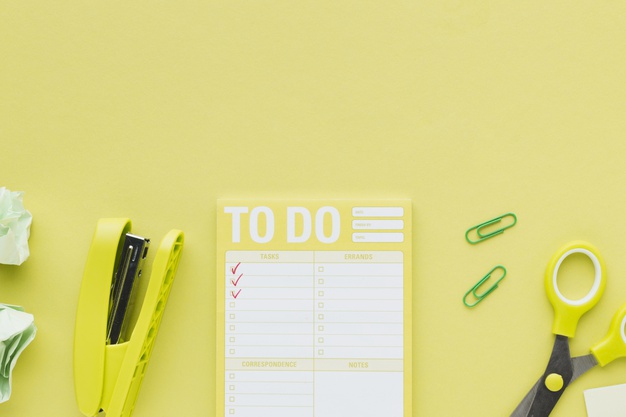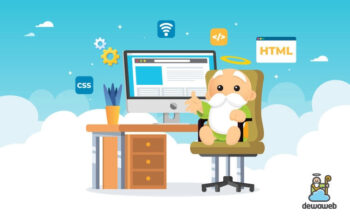Those of you who have to work from home, whether you’re self-employed or freelancing or due to pandemic working arrangements, know very well the challenge of procrastination and the comfort of your couch. Working from home can also ruin the boundaries between work and personal life, where you tend to work too hard with no personal life left.
So how to stay productive at home, and at the same time stay balanced? As I’m one of those impacted by work-from-home arrangements due to the pandemic, I’ve written before about how to be productive working from home. I asked some of my friends for their advice. They came with a few pieces of advice, and I try to summarize them for you to use as a guide. Some might not apply to you but the best way to use this is to understand the ideas that work for you and give them a try. Here I’m updating it with more advice as I’m spending most of my time working from home.
Here we go!
Working Space

Define your working space where you can separate workspace from personal space. Have a room or space or corner (whichever suits you) dedicated to working. Don’t do it wherever you happen to be. Set aside some space, preferably a room (it doesn’t have to be big) to be your workspace. It can be one of your corners in the house with a desk and a chair. That way, when you enter this room or space, you know consciously what you’re there to do: go to work. It changes the state of mind from “I’m at home” to “I’m at work”.
Close the door. It’ll be very easy to leave the door to whatever room or space you set apart to be your workspace. If the door is open, it allows your mind to wander off the room. If you’re having a family, it represents the idea that Dad is around, and I can go and talk to him.
I’ve mentioned this in my previous post on how to be productive working from home and you can find more about it there.
Working Time

Start the day properly. Don’t stay in pajamas. Instead, have breakfast, have a shower, and get dressed. Then make a list of sensible tasks for the day and get started. Have a good breakfast, relax, meditate, and pray. Just make sure that your mind isn’t in the “I hate working” frame of mind. No turning on the computer for a quick email check or to do anything from your to-do list until you’ve gotten “ready for work” as mentioned above. That 1 little thing might lead to breakfast at 11 in the afternoon with your pajamas still on.
Schedule, around your natural schedule. Some people peak in the morning, others in the afternoon, others in the late hour. Set online times. You don’t always need to be accessible but be sure that you’re responding at an acceptable time. Set regular hours, and stick to the schedule. You might want to share this with your team member. If you use online messenger like SLACK, set your status to Available, Busy, or Away before leaving your workstation.
Track your work. I usually write what I’ve done upon completion on an accomplishment list, you can find more on my other post on some ideas for productive routine habits. At the end of the day, or week, you can see a summary of what you have accomplished.
Don’t stop working if it’s a hard day. There’ll be times when you haven’t got any ideas, or just don’t feel productive. Pay attention to how you spend your time. You are less inclined to watch television when you realize how much it can cost you to mess around. Put a reminder that “no work = no money”.
Designate certain days for certain work. For example: complete everything on Friday afternoon, no later than Friday evening. This allows you to walk out of your workspace for your “weekend” without feeling like you left work unfinished.
Know when to stop. Don’t work late into the night. Set defined times when you’re going to work, and then when it passes, stop. You can have overtime work, but make sure that you don’t end up letting work run your life.
Set boundaries for those around you as well. Schedule your work time and make sure the kids and spouse know when you are available for playing, chores, etc. during this time. Don’t allow work to consume your life. Make sure you set limits for the amount of time you will work.
Working Preparation

Keep three lists of three. The first list has three things you will do today. The second is three things you’d like to get done but aren’t essential. The third is three things that need to be done at some point.
Keep a notepad and pencil nearby. Jot down ideas for projects, or anything that springs to mind. Then have a pinboard to stick them on. Look at it twice a week to refresh your mind of things that could be done sometime. Some of the best work you’ll ever do will come from random bits of inspiration.
Keep your desk and general work area tidy. A tidy workspace helps keep a tidy mind, which helps make your day more productive. Have a pint of water by your desk all the time. Try and work up to drinking a few pints a day, if you don’t already.
Use Sound Canceling Headphones. Seriously useful if you have a running-around screaming toddler. Your voice must be clear during a video call, it helps everyone in the meeting to hear you clearly.
Don’t go back to work when you’ve finished. If suddenly you have a great idea for better work, write it down on a note, and pin it up. Don’t go back to work when you’ve finished.
Working Break

Give yourself breaks. Don’t be locked in the room all the time. For every hour you work, have a 15–30-minute break. Give your mind time to digest what it’s just done, then come back. You’ll improve the quality of what you produce a hundredfold. Even a field that has rested gives a bountiful crop.
Don’t work a straight eight hours day. You may try to work in for 2 hours and take 10 minutes to break before continuing working for another 2 hours. If you do a straight eight hours, your attention might start to wander and restless. Your work might not have good quality. Also, a nap should be a break, not your default work mode.
Be careful what music you listen to while you work. Music, TV, News, or anything that will affect your mood. Make sure that you surround yourself with things that will give you the best mood for whatever you’re about to do.
Make time for people. When people ask, give them what you can. Respond in some way to every email. It doesn’t matter how long it takes you to get around to it. You don’t have to reply at that moment. Just make sure you do. Saying thank you a lot also matters. Figure out the people who have helped you and your project the most. Make sure they know you’re grateful.
Be grateful you’re working from home where some might have to have a 2-3 hours commute! That gratitude will motivate you to work harder, so you can continue to work from home.


